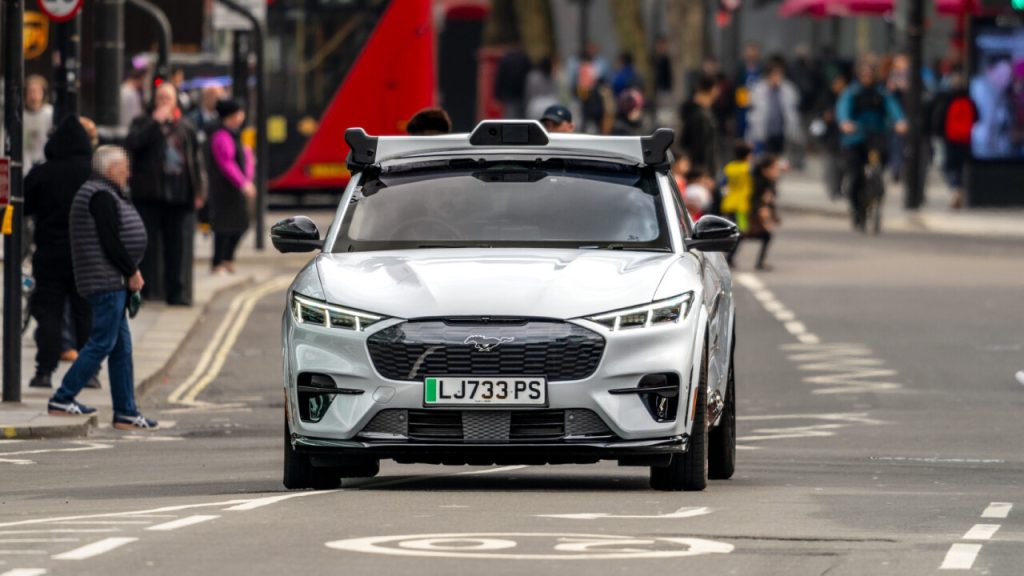For the UK’s artificial intelligence and autonomous vehicle sectors, London-based startup Wayve has raised a staggering $1.05 billion (£840 million) in funding. This investment is not only the largest ever for a European AI company but also a resounding vote of confidence in the potential of Wayve’s innovative “embodied AI” approach to powering self-driving cars.
The funding round was led by the Japanese investment juggernaut SoftBank, with tech titans Microsoft and leading chipmaker Nvidia also participating as investors. This diverse group of backers underscores the widespread excitement surrounding Wayve’s technology and its potential to reshape the future of transportation.
Prime Minister Rishi Sunak hailed the investment as a pivotal moment that “anchors the UK’s position as an AI superpower.” In his statement, Sunak emphasized the symbolic significance of a homegrown British company securing such a massive investment, calling it “a testament to our leadership in this industry.”
Alex Kendall, the co-founder and head of Wayve, echoed Sunak’s sentiments, stating that the funding “sends a crucial signal to the market of the strength of the UK’s AI ecosystem.” Kendall expressed optimism that Wayve’s success would pave the way for more British AI companies to “thrive and scale.”
While the UK government and Wayve’s leadership have struck an upbeat tone, it’s important to note that the world’s most valuable AI firms are still predominantly based in the United States and China. The UK’s competition watchdog is currently investigating whether a handful of big tech firms could potentially dominate much of the AI market, highlighting the ongoing challenges faced by UK startups in this highly competitive landscape.
So, what sets Wayve’s approach apart, and why has it garnered such substantial backing? The key lies in the company’s development of “embodied AI” technology, a novel paradigm that departs from traditional AI models focused on cognitive or generative tasks like answering questions or creating images.
Embodied AI, as Wayve envisions it, enables self-driving vehicles to interact with and learn from real-world surroundings and environments. This technology aims to equip autonomous cars with the ability to adapt to unexpected situations and learn from scenarios that defy strict patterns or rules, such as erratic behavior by drivers or pedestrians.
The implications of this approach are far-reaching, as it could potentially address some of the most significant obstacles to the widespread adoption of self-driving technology. Safety concerns, particularly in the wake of fatal crashes involving AI-powered driver assistance systems, have cast a shadow over the industry’s ambitions.
Regulatory bodies like the US National Highway Traffic Safety Administration (NHTSA) have been scrutinizing the safety of assistive driving features from manufacturers like Ford, whose BlueCruise technology deployed in Mustang Mach-E cars is currently under investigation. Even industry giant Tesla faced a massive recall of over two million vehicles in December 2022 following an NHTSA probe into the safety of its Autopilot system.
If Wayve’s embodied AI can deliver on its promise of enabling self-driving vehicles to navigate real-world complexities more effectively, it could help alleviate some of these safety concerns and pave the way for broader acceptance and adoption of autonomous vehicle technology.
The UK government appears to be positioning itself as a leader in this transportation revolution, with Transport Secretary Mark Harper predicting that self-driving vehicles could be on some UK roads by 2026. The Automated Vehicles Bill, expected to be passed by parliament soon, establishes a regulatory framework for the safe deployment of cars equipped with assistive or autonomous driving features on UK roads.
Notably, the government has stated its intention to clarify legal liability for companies and drivers, potentially removing a significant barrier to the widespread adoption of self-driving technology. This proactive stance aligns with the government’s assertion that the Automated Vehicles Bill will “unlock a transport revolution” in the UK.
From an economic perspective, the self-driving vehicle industry holds immense promise for the UK. According to government estimates, the sector could be worth £42 billion ($53 billion) and create 38,000 skilled jobs by 2035. Between 2018 and 2022 alone, the industry generated £475 million ($600 million) in investment and created 1,500 new jobs, underscoring its rapid growth trajectory.

While the excitement surrounding Wayve’s funding and the UK’s ambitious plans is palpable, it’s crucial to maintain a balanced perspective. The path to fully autonomous vehicles has been marked by numerous challenges and setbacks, and the realization of a “transport revolution” will likely require sustained effort, collaboration, and a commitment to addressing safety and ethical concerns.
The potential benefits in terms of improved safety, reduced traffic congestion, and increased mobility for underserved populations are compelling. However, the industry’s checkered history with safety issues and the potential for job displacement in sectors like transportation and logistics cannot be ignored.
Ultimately, the success of Wayve’s embodied AI approach and the UK’s autonomous vehicle ambitions will hinge on their ability to navigate these complex challenges while delivering on the promise of a safer, more efficient, and more equitable transportation future. The $1 billion investment in Wayve is undoubtedly a significant milestone, but it is merely the beginning of what promises to be a transformative journey for the UK and the global automotive industry.
Copyright©dhaka.ai
tags: Artificial Intelligence, Ai, Dhaka Ai, Ai In Bangladesh, Ai In Dhaka, Google, Claude, Future of AI, UK



